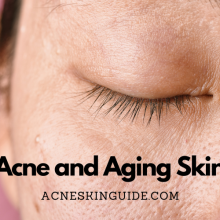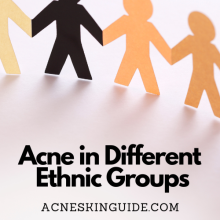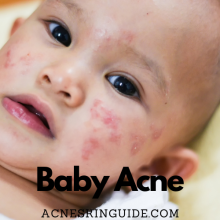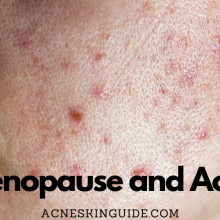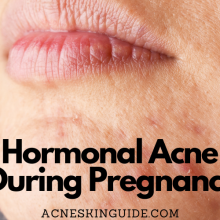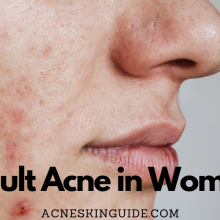Male Acne | Acne Skin Guide
Male acne is a widespread but frequently disregarded issue that can deeply impact self-confidence and overall well-being. Understanding the causes, including hormonal imbalances, stress, diet, and occupational factors, is key to effective treatment. Various forms of acne affect men, from cystic to truncal acne. Treatment options range from topical and oral medications to natural remedies and professional treatments like chemical peels and laser therapies.
Developing a consistent skincare routine, managing lifestyle factors, and addressing emotional challenges through support networks are essential. Debunking myths and normalizing male acne is crucial for reducing stigma. By taking a holistic approach to understanding and treating this condition, men can regain control over their skin health and confidence. With the right guidance, clear, healthy skin is achievable.
#1 Recommended Acne Treatment | #2 Recommended Acne Treatment |
 |  |

Male Acne: A Comprehensive Guide to Understanding and Treatment
Acne is often thought of as a teenage struggle, but the reality is that many men continue to battle this skin condition well into adulthood. Male acne is a common yet frequently overlooked issue that can significantly impact self-confidence and overall well-being. This comprehensive guide aims to shed light on the causes, types, and effective treatments for acne in men, while also addressing the emotional and social aspects of dealing with this condition.
Understanding Male Acne
To effectively treat male acne, it’s crucial to understand its underlying causes. Hormonal imbalances, particularly fluctuations in androgen levels during puberty and adulthood, can lead to increased oil production and clogged pores, contributing to acne breakouts. Stress is another major factor, as it can trigger hormonal changes and inflammation, exacerbating acne.
Diet and nutrition also play a role. Consuming excessive dairy products or high-glycemic foods has been linked to increased acne severity. Additionally, certain occupational factors, such as working in humid or greasy environments, can contribute to acne breakouts.
Types of Acne in Men
Acne can manifest in various forms in men, ranging from cystic and inflammatory to back and chest acne (truncal acne). Cystic acne involves painful, pus-filled lesions deep within the skin, while truncal acne is common due to the high concentration of oil glands in these areas. Adult male acne can persist beyond teenage years due to hormonal imbalances or other underlying factors.
Some men may also experience acne mechanica, caused by friction, heat, or pressure from tight clothing or equipment, or acne fulminans, a severe form of inflammatory acne that can lead to scarring and systemic symptoms.
Treating Male Acne
Fortunately, there are various treatment options available for managing male acne. Topical treatments, such as men’s acne products (cleansers, toners, and spot treatments) and prescription medications like retinoids or benzoyl peroxide, are often the first line of defense against mild to moderate acne.
For more severe or persistent cases, oral treatments like antibiotics or hormonal therapies (birth control pills or anti-androgens) may be necessary to reduce inflammation, control bacterial growth, and regulate hormone levels.
Natural remedies, such as dietary changes (increasing omega-3s and reducing dairy), herbal remedies (aloe vera or honey), and the use of tea tree oil or green tea, offer a gentler approach to acne management due to their antibacterial and anti-inflammatory properties.
Professional treatments, including chemical peels, laser and light therapies, and microdermabrasion, can provide more intensive acne management by removing dead skin cells, unclogging pores, and targeting specific acne-causing bacteria.
Potential Downsides of Acne Treatments:
While various acne treatments can be effective, it’s important to note that some may have potential downsides or side effects. Topical and oral medications can sometimes cause dryness, irritation, or sensitivity to sunlight. Certain oral treatments, like isotretinoin (Accutane), can have more serious side effects and require close monitoring by a dermatologist. Natural remedies may have fewer side effects but may also be less potent in treating severe acne. Professional treatments can be costly and may require multiple sessions for optimal results.
Acne Skincare Routine for Men
Developing a consistent skincare routine is essential for managing male acne. Proper cleansing and exfoliating help remove excess oil, dead skin cells, and bacteria that can clog pores. Moisturizing, even for oily or acne-prone skin, is crucial to maintain a healthy skin barrier.
Shaving and grooming considerations are also important for men with acne, as improper techniques can aggravate breakouts. Sun protection, using non-comedogenic (non-pore-clogging) sunscreens, is vital for all skin types, and spot treatments and concealing products can help manage and camouflage active acne lesions.
Lifestyle Factors and Prevention
Lifestyle factors play a significant role in preventing acne flare-ups. Managing stress through relaxation techniques, exercise, or therapy can help regulate hormones and reduce inflammation. Regular exercise and staying hydrated can also promote healthy skin and potentially reduce acne.
Identifying and avoiding individual triggers, such as certain foods, medications, or environmental factors, is key to preventing breakouts. For example, consuming excess dairy or high-glycemic foods may worsen acne for some individuals, while certain medications like corticosteroids or anabolic steroids can contribute to acne development. Stress management techniques, such as meditation or yoga, can help prevent stress-induced acne breakouts.
Dealing with Acne Scars and Self-Confidence
Acne can leave behind physical and emotional scars. Various treatment options, including chemical peels, laser treatments, and microneedling, are available for addressing acne scarring. However, it’s equally important to address the impact of acne on a man’s self-esteem and emotional well-being.
Coping strategies and support networks can help men navigate the emotional challenges of dealing with acne. Online communities and forums offer a space to connect with others facing similar struggles, while counseling and therapy options can help individuals develop healthy coping mechanisms and improve self-esteem.
Male Acne Myths and Facts
Debunking common myths surrounding male acne is crucial for proper understanding and treatment. Relying on reliable sources of information, such as dermatologists or reputable medical websites, is essential for accurate knowledge.
Addressing misconceptions about acne and masculinity is also important to normalize the condition and reduce stigma. Societal stigma and stereotypes can contribute to feelings of shame or embarrassment for men with acne, but normalizing acne in men can help break down these harmful perceptions and promote open conversations about the condition.
Acne and Men’s Grooming
Proper shaving techniques for acne-prone skin can prevent further irritation and breakouts. Choosing acne-friendly grooming products that are non-comedogenic and gentle on the skin is essential. For those who desire it, makeup and concealer options for men are available to help camouflage active acne lesions.
Conclusion
Male acne is a real and often overlooked issue that can have a profound impact on a man’s overall well-being. By understanding the causes, types, and various treatment options available, men can take control of their skin health and confidence. It’s crucial for men to seek proper guidance and treatment for their acne, as addressing it in a holistic manner can lead to positive physical and emotional outcomes. Remember, acne is a treatable condition, and with the right approach, men can achieve clear, healthy skin and regain their self-assurance.
#1 Recommended Acne Treatment | #2 Recommended Acne Treatment |
 |  |
Summary and FAQs
Can bodybuilding supplements or steroids cause acne in men?
Yes, bodybuilding supplements and anabolic steroids can potentially cause or worsen acne in men. Here’s some more information:
Anabolic Steroids:
- Anabolic steroids are synthetic versions of the male hormone testosterone. Taking high doses of these steroids can lead to hormonal imbalances.
- This increase in androgens like testosterone can overstimulate the oil glands in the skin, causing excess sebum production.
- The excess sebum can clog pores and lead to acne breakouts, often in the form of large, inflamed pimples or cystic acne lesions.
Bodybuilding Supplements:
- Some bodybuilding supplements contain substances that may affect hormone levels if taken in high doses.
- Supplements with prohormones, testosterone boosters, or derivatives of dihydrotestosterone (DHT) can increase androgenic effects.
- This androgenic activity can stimulate oil production just like anabolic steroids, increasing acne risk.
- Supplements with whey protein or supplements high in vitamins B6/B12 have also been potentially linked to acne flare-ups in some individuals.
In general, any substance that causes major hormone fluctuations or enhances androgenic effects can disrupt the skin’s oil balance and contribute to acne development or worsening of existing acne in men. Proper medical supervision is advised when using such supplements or steroids.
How does smoking affect male acne?
Smoking can have a negative impact on male acne in several ways:
- Increased inflammation
Smoking introduces numerous toxins and chemicals into the body, which can trigger inflammation in the skin. This increased inflammation can worsen acne by causing existing pimples to become more inflamed, red, and painful. - Impaired skin healing
Smoking impairs the skin’s ability to heal and regenerate properly. This delayed healing response can prolong the life cycle of pimples, leading to more stubborn breakouts that take longer to clear up. - Oxidative stress
The oxidative stress caused by smoking generates free radicals that damage skin cells and collagen. This oxidative damage can contribute to the formation of acne lesions and worsen the overall condition of the skin. - Hormonal disruptions
Some components in cigarette smoke, such as cadmium, can disrupt hormone levels and increase the production of androgens like testosterone. This hormonal imbalance can overstimulate oil glands, leading to excess sebum production and clogged pores, which are prime conditions for acne development. - Reduced circulation
Smoking constricts blood vessels, reducing circulation and the delivery of oxygen and nutrients to the skin. This can impair the skin’s ability to repair itself and fight off acne-causing bacteria effectively.
Additionally, the act of smoking itself can transfer oils and bacteria from the fingers to the face, potentially clogging pores and exacerbating acne breakouts.
Therefore, quitting smoking or avoiding it altogether can be beneficial for managing and preventing acne in men, as it reduces inflammation, improves skin healing, and restores hormonal balance.
Can male pattern baldness treatments cause acne?
Yes, certain treatments for male pattern baldness can potentially cause or worsen acne as a side effect. The two main treatments that may be linked to acne are:
- Finasteride (Propecia)
Finasteride is an oral medication that works by blocking the conversion of testosterone to dihydrotestosterone (DHT), a hormone that contributes to hair loss. However, this interference with hormone levels can sometimes lead to an increase in testosterone levels, which can stimulate excess oil production and clog pores, resulting in acne breakouts. - Minoxidil (Rogaine)
Minoxidil is a topical solution applied directly to the scalp to promote hair growth. While not as common, some men may experience acne or skin irritation as a side effect of using minoxidil, particularly if it is not rinsed off properly and allowed to spread to other areas of the face.
The exact mechanisms behind how these treatments cause acne are not fully understood, but it is believed to be related to their effects on hormone levels and the skin’s oil production.
It’s important to note that not all men will experience acne as a side effect of using these baldness treatments, and the severity can vary. However, if acne does develop or worsen after starting these medications, it is advisable to consult with a dermatologist or the prescribing doctor to discuss potential adjustments or alternative treatment options.
Proper skincare routines and acne management strategies may also be necessary to mitigate any acne-related side effects while undergoing male pattern baldness treatment.
How do different skin types affect acne treatment for men?
Different skin types can greatly influence the most effective acne treatment approach for men. Here’s how various skin types may affect acne treatment:
- Oily Skin:
Men with oily skin tend to produce excess sebum, which can clog pores and lead to acne breakouts. For this skin type, oil-free and non-comedogenic products are crucial. Treatments that help control oil production, such as retinoids, benzoyl peroxide, or salicylic acid, may be particularly beneficial. However, these drying treatments should be used cautiously to avoid over-drying the skin, which can lead to more oil production. - Dry Skin:
Men with dry skin may experience acne due to factors like hormonal changes or certain medications. For them, gentle, non-irritating treatments are essential to avoid further drying out the skin. Hydroxy acids, like lactic acid or glycolic acid, can help exfoliate without over-drying. Moisturizers with ceramides or hyaluronic acid can help maintain the skin’s moisture barrier while treating acne. - Sensitive Skin:
Those with sensitive skin may experience irritation or redness from certain acne treatments. For them, natural or botanical-based products may be more suitable, as they tend to be gentler on the skin. Treatments like sulfur, azelaic acid, or tea tree oil can be effective options for sensitive skin types. - Combination Skin:
Men with combination skin may have an oily T-zone (forehead, nose, and chin) and drier cheeks. In this case, a targeted approach is often necessary, using oil-controlling products on the oily areas and more hydrating products on the drier areas. Spot treatments can also be helpful for addressing specific breakouts. - Aging Skin:
As men age, their skin may become drier and less resilient. Acne treatments that are too drying or harsh can further exacerbate this issue. Gentle exfoliation, hydrating products, and treatments with anti-aging benefits, like retinoids, may be more appropriate for older men with acne.
It’s essential for men to work closely with a dermatologist to determine their specific skin type and the most suitable acne treatment regimen. Tailoring the approach to their individual skin needs can improve treatment effectiveness and minimize potential side effects or irritation.
Can acne in men be a symptom of an underlying health condition?
Yes, in some cases, acne in men can be a symptom of an underlying health condition. While acne is commonly attributed to factors like hormonal changes, stress, and lifestyle habits, it can also be a manifestation of certain medical conditions. Here are some examples:
- Polycystic Ovary Syndrome (PCOS):
Although primarily associated with women, men can develop a condition similar to PCOS, characterized by hormonal imbalances and increased androgen levels. This can lead to acne, as well as other symptoms like male pattern baldness and fertility issues. - Endocrine Disorders:
Conditions that affect the endocrine system and hormonal balance, such as Cushing’s syndrome, congenital adrenal hyperplasia, or hyperthyroidism, can sometimes cause acne as a secondary symptom due to the hormonal imbalances they create. - Certain Cancers:
In rare cases, acne can be a symptom of certain types of cancers, particularly those that affect hormone-producing glands or organs like the pituitary gland, adrenal glands, or testicles. Sudden, severe, and persistent acne in men may warrant further medical evaluation. - Metabolic Disorders:
Conditions like insulin resistance, obesity, or diabetes have been linked to an increased risk of acne in some individuals. The hormonal and metabolic imbalances associated with these disorders can influence sebum production and inflammation, contributing to acne development. - Digestive Disorders:
Gastrointestinal issues, such as inflammatory bowel diseases (IBD) like Crohn’s disease or ulcerative colitis, can sometimes cause acne flare-ups in men. The inflammation and nutrient malabsorption associated with these conditions may play a role in acne development.
While acne is more commonly a result of hormonal fluctuations, stress, or lifestyle factors, it is important to consider the possibility of an underlying health condition, especially if the acne is severe, persistent, or accompanied by other unusual symptoms. In such cases, it is advisable to consult a dermatologist or healthcare provider for proper evaluation and treatment.

